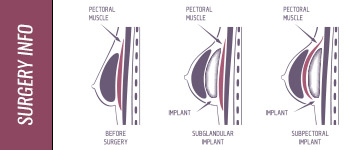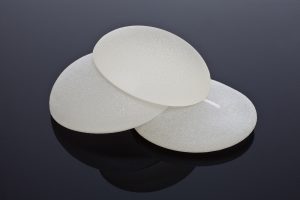
If you can plan ahead well enough, it’s wiser to have the baby before the breast implants. After feeding a baby for several months or a year or so, many women notice a little shrinkage and sagging in their breasts. So if no more babies are wanted, this is a good time to have breast implant surgery.
If you have already had breast augmentation done and are considering having a baby, the first thing to get clear is that most cosmetic surgeons agree that breast implants pose no risk whatever to having a normal pregnancy. And conversely, that a pregnancy poses no risk at all to the breast implants.
WHAT’S IN A BREAST?
Breast tissue consists of milk-producing sacs that connect to milk ducts, which converge at the nipples, about 20 to each nipple. Around these sacs and ducts is connective tissue that gives support, and fatty tissue that gives protection. In the nipples are nerve endings, sweat glands, muscle fibers and sebaceous glands.
During pregnancy, the breasts will change and enlarge as they prepare to make and store milk. But this happens independently of the presence of implants.
Breast implants are inserted in one of two places:
- Beneath the breast tissue and above the pectoral muscles; or
- Beneath the pectoral muscles and above the chest wall
Whichever place it is inserted, the breast implant does not interfere with the activity of the breast itself.
POSSIBLE EFFECTS FROM THE INCISION
The surgical procedure used to insert the breast implants is an issue separate from the simple presence of those implants. If silicone gel breast implants were inserted, the incision is usually under the breast or near the armpit and will not affect the milk-producing process. If saline implants were inserted, the incisions will have been smaller, and they may have been made at the aureola, the circular darkened area around the nipple.
In this case, depending on how the surgery was done, milk ducts or nerves may have been damaged or cut. This may have happened only on one side, or on both.
If milk ducts were interfered with, the flow of milk to the baby may be decreased. If nerves were affected, the nipple may be either extra sensitive, or less sensitive. If extra sensitive, discomfort may be experienced during nursing. If less sensitive, the milk may not let down when the infant starts to suckle and manual stimulation may be necessary to trigger it. Also, proper nerve function tells the brain to release hormones that promote milk production.
Every woman is different and every instance of surgery unique. So no flat generalizations can be made and in practice, you won’t know if or how your breasts have been affected until you start nursing the baby.
LEAKAGE OF SILICONE INTO MILK
There’s currently no evidence suggesting that silicone leaks into the breast milk. Nor is there evidence to confirm that it doesn’t. Mostly this is because not enough information has been gathered or analyzed yet. There are no methods yet for detecting silicone in breast milk.
However, if some silicone did leak into the milk, many say that it would not harm the baby, as silicone is similar to a substance that is sometimes used to decrease a baby’s stomach gas.
IN CONCLUSION
The chances are good that you can nurse your baby after breast implants have been inserted, but no firm predictions can be made. Close monitoring of the baby’s weight would be wise, to make sure enough milk is being produced. If necessary, you can supplement with formula.




